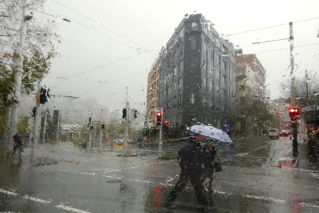Scott Morrison is under pressure to fund a pandemic leave scheme to pay workers who have to isolate after a positive COVID diagnosis or while awaiting a test result, with fears that failing to do so could start a “second wave”.
Trade unions say the reform, which would discourage low-paid or casual workers from going to work while infectious, would be a critical life-saving reform.
An analysis revealed there has been more than 150 workplace outbreaks in Victoria this month alone.
“This initiative is essential to defend our country against the spread of the virus. It will save both lives and jobs,” Australian Council of Trade Unions secretary Sally McManus told The New Daily.
Federal and state officials have been pleading with Australians for months to stay home if sick, rather than potentially infecting others in offices or on public transport.
Sick workers are “the biggest driver of transmission” in Victoria now, Premier Daniel Andrews said, with infected workers thought to be the root cause of deadly outbreaks in nursing homes statewide.

Daniel Andrews wants sick workers to stay home. Photo: AAP
“The lockdown will not end until people do not go to work with symptoms,” Mr Andrews said on Wednesday.
On Thursday, he said health workers door-knocking households that were meant to be isolating were told that one man, who had a positive COVID diagnosis, was not at home but instead at work.
Victoria is making $300 payments to people who miss work while awaiting test results, and $1500 for workers who test positive.
Many aged-care workers were granted two weeks of paid ‘pandemic leave’ if they have to isolate, but the perk is not available to all employees, and the federal government is under pressure to make it available widely.
“A paid pandemic leave scheme is a critical measure to protect both workers and public health by preventing further COVID-19 outbreaks. It should have been introduced months ago,” Labor leader Anthony Albanese and shadow industrial relations minister Tony Burke said on Thursday.
“Workers cannot be forced to choose between paying their bills and protecting their colleagues, customers and patients.
“Whenever we force that choice on people the community is put at risk.”
Pandemic leave is considered essential, as some workers – especially casuals or those in contract work – may not have access to sick leave or holidays, leaving them out of pocket if they can’t work.
Labor said 3.7 million people had no access to paid sick leave, while many more had used up their legal entitlements already.

Tony Burke and Anthony Albanese call for pandemic leave. Photo: AAP
Labor has been calling for such a scheme since March.
The opposition wants it available to all workers.
“Without pandemic leave, many will continue to turn up to work when they’re sick or should be isolating,” Mr Albanese and Mr Burke said.
The Prime Minister gave his strongest indication yet that the government was considering the idea.
At a press conference on Thursday, he said Industrial Relations Minister Christian Porter was “working those discussions through.”
“We’re conscious of the issues and we’re seriously pursuing them,” he said.
Ms McManus said the ACTU wanted to see a ‘wage replacement’ system, where people would be paid their normal salary while isolating, to encourage people to stay home.
“We welcome the Prime Minister asking Minister Porter to discuss how we can implement paid pandemic leave for all workers,” she said.
The ACTU provided a policy brief to Mr Porter’s office on Wednesday on the need for the reform.
In the document, obtained by The New Daily, the union body said it wanted “every single worker to have access to paid pandemic leave” funded by the federal government.

Sally McManus says pandemic leave is “essential”. Photo: AAP
“It has become abundantly clear that the virus is being spread in workplaces where people are in insecure and casual work and have no paid leave, or amongst permanent workers who have exhausted or have only minimal sick leave,” the document outlined.
The ACTU said it had conducted analysis showing “over 150 workplace outbreaks since the start of July”, with many of those being in industries “known for their reliance on insecure and casual workers”.
“Given that so many workers in Australia have no access to paid sick leave, staying at home while sick in many cases is not financially feasible,” the union body said.
“The high proportion of workers without paid sick leave leaves the entire community vulnerable to the risk of a second wave of community-based transmission”.









